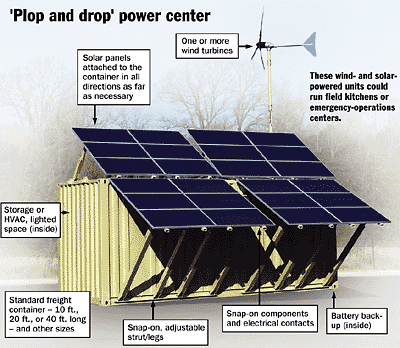Sky Built Power Center
Posted By RichC on October 19, 2005

An Arlington Virginia company, SkyBuilt Power Inc, has found a new investor in its “drop and plop” electricity generating units: the 1999 CIA founded company called In-Q-Tel. The new investor will allow continued investment in a fuel-less power unit that can be used to provide continual power for small units in remote locations.
In September, the Wall Street Journal detailed the objective of this privately run investment company that makes it more efficient to develop the many products helpful to our country working around the world. This recent investment might help even the private sector, especially in rural areas, live a more comfortable and efficient off the grid life.
SkyBuilt’s Mobile Power Station (MPS) can generate up to 150 kilowatts of electricity, says David Muchow, the firm’s president and CEO. That’s enough to power an emergency operations center, an Army field kitchen, or a small medical facility. Skybuilt and In-Q-Tel announced Tuesday that they have signed a strategic development agreement, including an investment in SkyBuilt.
In-Q-Tel’s support is a breakthrough for the small firm. (The “Q” in In-Q-Tel is a whimsical play on the movie character “Q” who supplies James Bond with nifty gadgets.) SkyBuilt provides innovative energy solutions with the potential to help meet a wide variety of critical government and commercial power needs, says Gilman Louie, In-Q-Tel president and CEO.
The power stations could have important uses for disaster relief, homeland security, military operations, intelligence work, and a variety of commercial applications. The units are not yet designed for use by homeowners. After hurricane Katrina, SkyBuilt units could have been rushed to the scene and set up in hours, restoring power to hospitals, evacuee centers, police and fire departments, and cellphone towers.
One big drawback of solar energy until now has been that it was a “custom industry,” says Scott Sklar, vice president of SkyBuilt. Components are usually put together on-site, and differ from location to location. “When you buy a car, do they ship in all the pieces to your front yard and have somebody assemble it? I’m afraid not.
It works this way: Parts for each Skybuilt unit are packed into standard-size shipping containers. The containers, specially modified and strengthened, can be moved by ship, truck, train, or even dropped by a laser-guided parachute to the most remote location.
Once on-site, the container is opened, and arms and poles are attached to the outside to hold solar cells and wind turbines. A prototype built here in Arlington has been running steadily for more than a year without repairs or maintenance.
While SkyBuilt has 140 patent claims on its energy system, most of its individual component parts are widely available. Mr. Muchow explains that its MPS can use photovoltaic cells, small wind turbines, computers, batteries, and other parts from essentially any manufacturer.
This open architecture allows its MPS units to be upgraded whenever a battery or other manufacturer comes out with a better product. It also reduces costs.
This was attractive to In-Q-Tel. The government could develop its own advanced technology (as “Q” might do). But it is far less costly to support technology like SkyBuilt’s that also finds a larger market in the private sector, says Troy Pearsall, vice president of technology at In-Q-Tel.
In-Q-Tel, meanwhile, has signed agreements similar to this one with more than 80 companies since it was set up in 1999. Its mission is to identify and invest in firms with cutting-edge technologies that can aid US national security.
Reported in the Christian Science Monitor.
Comments